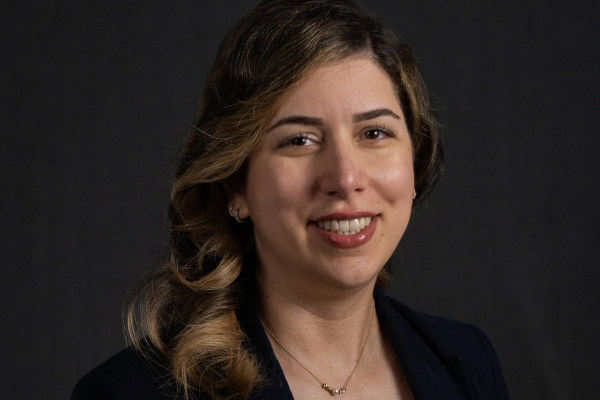Assistant Professor Paria Gharavi is researching ways technology can be faster, more reliable and more durable through her work as a materials scientist and electron microscopist.
Gharavi joined UCF in Fall 2023 as part of an infusion of new talent to the Department of Materials Science and Engineering and the College of Engineering. The department has since added nine additional faculty members with more to come in 2025.
“UCF is a rapidly growing institution, offering an ideal environment for my work in materials science,” says Gharavi.
The university’s commitment to research, innovation and interdisciplinary collaboration was a major factor in Gharavi’s decision to continue her career at UCF. In addition, she says Orlando offered numerous opportunities for industry collaboration, particularly in the aerospace and technology sectors.
“I was also drawn to UCF because I knew several faculty members who are incredibly supportive of early-career faculty, which is important for professional growth and success,” she says. “Also, UCF’s focus on student engagement and diversity aligns with my passion for mentoring the next generation of scientists and engineers.”
Gharavi specializes in advanced transmission electron microscopy (TEM) techniques that address extensive, complex materials challenges. Her work involves generating novel materials that can be used in a number of fields, including energy, electronics, artificial intelligence and biomaterials.
“My research is focused on the fascinating world of multifunctional materials, exploring their growth, synthesis and atomic-scale structural characterization,” she says. “It is driven by my passion to understand the intricate structure-property relationships in materials, I investigate various applications, from memory devices to microelectromechanical systems.”
Gharavi is focusing on two main areas in her research, both of which she says involve unlocking the potential of materials to create more powerful and efficient applications.
The first focus area lies in ferroelectric thin film materials, which have the potential to deliver faster and more reliable performance in ubiquitous technology like smartphones and computers.
“Imagine these materials as tiny, high-tech switches that can store and manage information efficiently,” Gharavi says. “We’re trying to make these materials even better for use in things like computer memory and sensors.”
Her second main focus area, interface engineering of artificial intelligence alloys, involves creating stronger, more durable materials that can improve performance in widespread applications, including those used in the aerospace and energy sectors.
“Think of it like ensuring that the pieces of a puzzle fit together perfectly,” Gharavi says. “By studying these interfaces, we aim to gain a better understanding of the structural and chemical properties of the materials.”
Always the innovator, Gharavi has her sights set on additional research areas that she plans to tackle in the future. Using in-situ TEM techniques, she’ll be studying biomaterials and how they interact with the human body with the goal of developing more effective medical implants and devices. She also plans to study nanomaterials and how they can be used in artificial intelligence, research that has the capability of improving everything from computational efficiency and novel smart materials that respond to stimuli.
“These areas offer exciting opportunities to advance both medical technology and artificial intelligence,” she says.
Gharavi received her master’s degree from Sharif University of Technology in Tehran, Iran, in 2014 and her doctorate from the University of South Wales in Sydney, Australia, in 2019. She came to UCF from the University of Pennsylvania, where she pursued postdoctoral research in materials characterizations using electron microscopy.
- Written by Bel Huston
- Dec. 11, 2024
